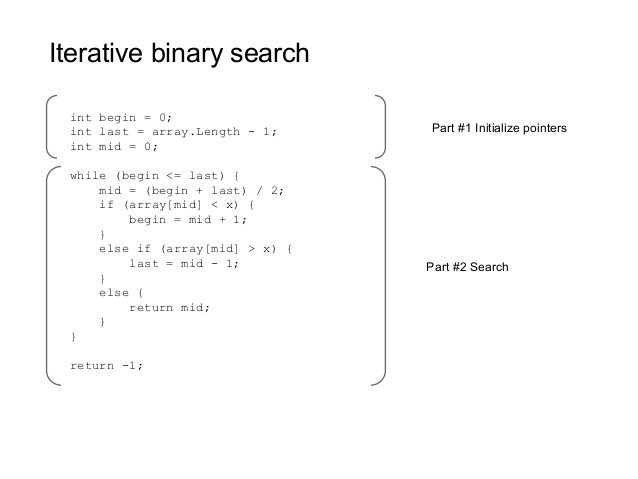Binary Search in Java without Recursion – Iterative algorithm
This week’s task is to implement binary search in Java, you need to write both iterative and recursive binary search algorithm. In computer science, a binary search or half-interval search is a divide and conquer algorithm which locates the position of an item in a sorted array. Binary search works by comparing an input value to the middle element of the array. The comparison determines whether the element equals the input, less than the input or greater. When the element being compared to equals the input the search stops and typically returns the position of the element. If the element is not equal to the input then a comparison is made to determine whether the input is less than or greater than the element. Depending on which it is the algorithm then starts over but only searching the top or a bottom subset of the array’s elements. If the input is not located within the array the algorithm will usually output a unique value indicating this.
Binary search algorithms typically halve the number of items to check with each successive iteration, thus locating the given item (or determining its absence) in logarithmic time. A binary search is a divide and conquers search algorithm. It works by dividing input set into half and then applying the algorithm and repeating the same steps until work is done.
Binary Search implementation in Java
The algorithm is implemented recursively. Also, an interesting facto to know about binary search implementation in Java is that Joshua Bloch, author of famous
Effective Java book wrote the binary search in “java.util.Arrays”.
import java.util.Arrays; import java.util.Scanner;
/**
* Java program to implement Binary Search. We have implemented Iterative
* version of Binary Search Algorithm in Java
*
* @author Javin Paul
*/
public class IterativeBinarySearch {
public static void main(String args[]) {
int[] list = new int[]{23, 43, 31, 12};
int number = 12;
Arrays.sort(list);
System.out.printf("Binary Search %d in integer array %s %n", number,
Arrays.toString(list));
binarySearch(list, 12);
System.out.printf("Binary Search %d in integer array %s %n", 43,
Arrays.toString(list));
binarySearch(list, 43);
list = new int[]{123, 243, 331, 1298};
number = 331;
Arrays.sort(list);
System.out.printf("Binary Search %d in integer array %s %n", number,
Arrays.toString(list));
binarySearch(list, 331);
System.out.printf("Binary Search %d in integer array %s %n", 331,
Arrays.toString(list));
binarySearch(list, 1333);
// Using Core Java API and Collection framework
// Precondition to the Arrays.binarySearch
Arrays.sort(list);
// Search an element
int index = Arrays.binarySearch(list, 3);
}
/**
* Perform a binary Search in Sorted Array in Java
*
* @param input
* @param number
* @return location of element in array
*/
public static void binarySearch(int[] input, int number) {
int first = 0;
int last = input.length - 1;
int middle = (first + last) / 2;
while (first <= last) {
if (input[middle] < number) {
first = middle + 1;
} else if (input[middle] == number) {
System.out.printf(number + " found at location %d %n", middle);
break;
} else {
last = middle - 1;
}
middle = (first + last) / 2;
}
if (first > last) {
System.out.println(number + " is not present in the list.\n");
}
}
}
Output
Binary Search 12 in integer array [12, 23, 31, 43]
12 found at location 0
Binary Search 43 in integer array [12, 23, 31, 43]
43 found at location 3
Binary Search 331 in integer array [123, 243, 331, 1298]
331 found at location 2
Binary Search 331 in integer array [123, 243, 331, 1298]
1333 is not present in the list.That’s all about how to implement an iterative binary search in Java.
Thanks for reading this article so far. If you like this article then please share with your friends and colleagues. If you have any questions or feedback then please drop a note.
| Published on Java Code Geeks with permission by Javin Paul, partner at our JCG program. See the original article here: Binary Search in Java without Recursion – Iterative algorithm Opinions expressed by Java Code Geeks contributors are their own. |




in binarySearch() function, we can move the statement int middle = (first + last) / 2; to first statement inside the while loop and remove the last statement in the while loop